Personality type and home caretaking

Key takeaways:
- The average person cleans in the morning, but highly neurotic people put it off until the afternoon
- Social media and family needs were most likely to distract people from house cleaning, followed closely by hunger and boredom
- Extroverts were more likely than introverts to be disgusted when visiting a dirty home
One way or another, we all know that our homes eventually need cleaning. Some of us constantly keep things spotless, while others aren't in as big a rush to pick up a sponge or mop. We conducted a survey to find out whether these differences have any correlation to the Big Five personality traits—essentially answering the question, are people's cleaning habits influenced by their character and nature?
Conscientiousness, agreeableness, openness, extroversion and neuroticism make up the five basic dimensions of personality. All of us fall somewhere on the spectrum of each of these traits, and we're about to find out if our placement has anything to do with our home caretaking habits. Read on to find out!
Identifying Neatniks
Cleaning frequency varies from person to person; let's see how the personality types of our respondents factored into the equation. Also, when was their preferred time to get chores done?
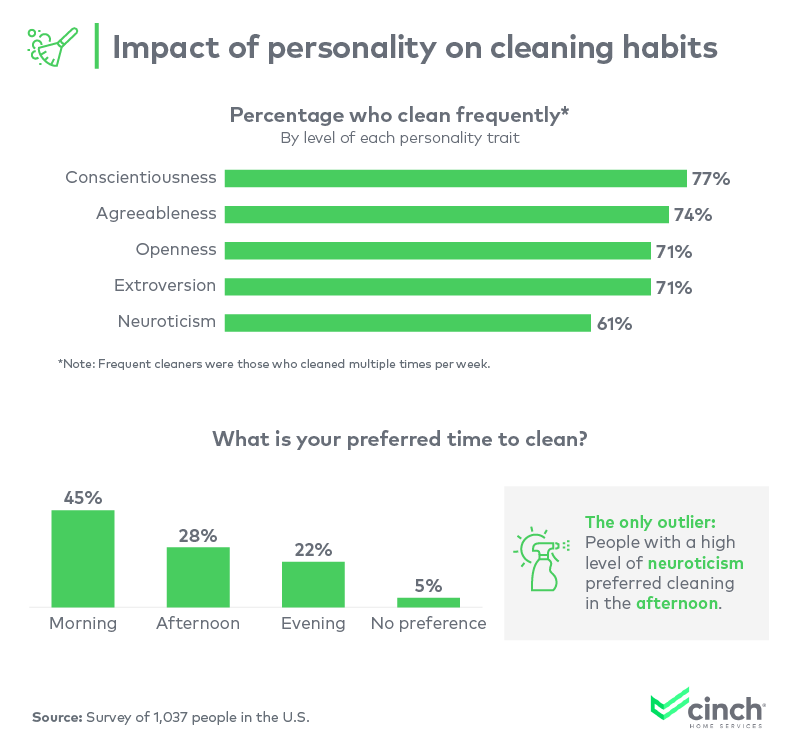
We determined the percentage of respondents who clean frequently and broke the results down by their position on the spectrum for each personality trait. Those who showed high levels of neuroticism were least likely to say they cleaned frequently, and those with a high level of conscientiousness were the most likely to say they cleaned frequently. Those who are conscientious are more likely to be responsible and organized, therefore cleaner.
Regarding preferred cleaning times, getting it done in the morning was the clear-cut choice. Morning routines have been scientifically proven to help boost our productivity, lower our stress levels, and give us a heightened sense of peace—by the time the evening rolls around, our morning cleaners are likely in full relaxation mode.
A messy affair
We may need to consult Merriam-Webster on this one, as respondents lacked consensus between the two different ways to define the term "messy." Was one interpretation more popular than the other for different personality types?
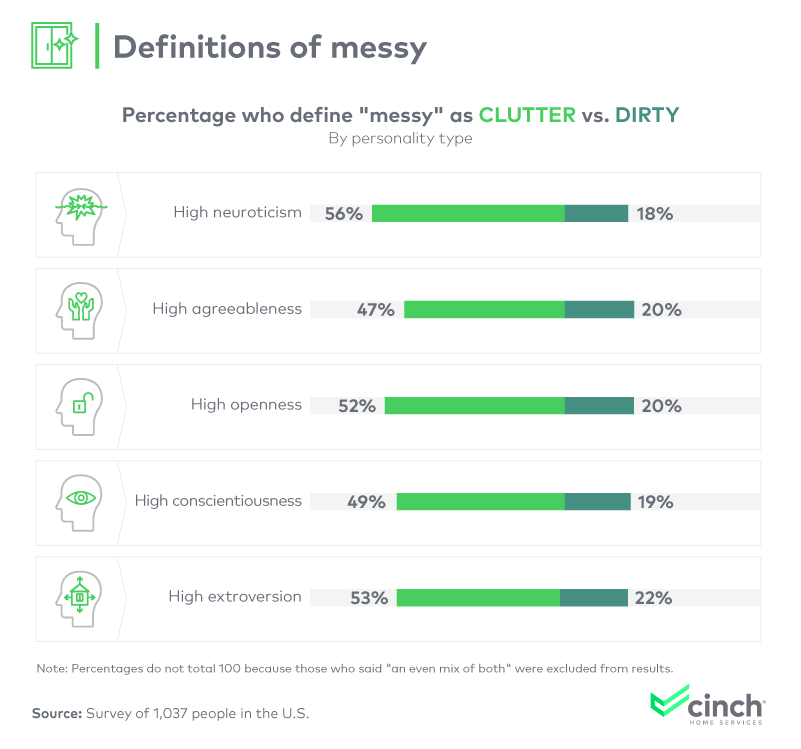
Regardless of personality type, the vast majority of respondents were more likely to associate the word "messy" with clutter instead of dirt. This was especially true for highly neurotic people, meaning those who experience a lot of stress, anxiety and irritability. Clutter or mess tends to be worse for these people overall, leading to even higher levels of stress and anxiety.
How tolerant are you?
As we know, everyone has their own cleaning regimen. Sometimes, though, an exceptionally untidy house could strike a negative chord with guests. But who's most likely to show revulsion by such a situation?
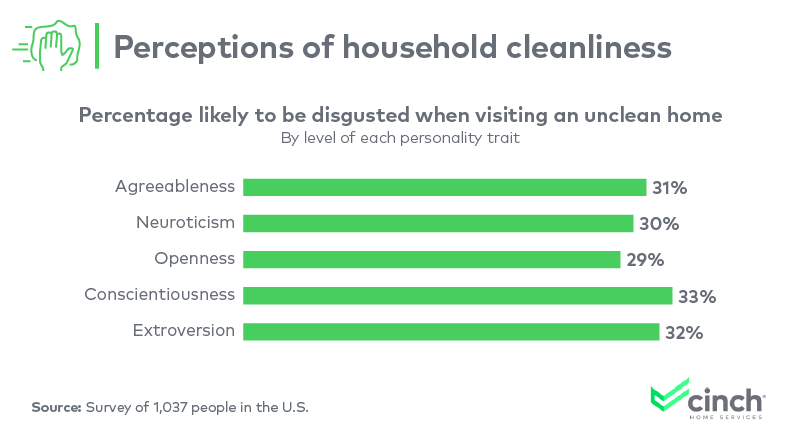
Most respondents could tolerate being in a house that was very unkempt, seeing as the highest percentage of people citing disgust by the situation was just 33%. This percentage related to those with a high level of conscientiousness, who pride themselves on their organizational skills. Clearly, an unclean house can rub them the wrong way a lot faster than those who are more altruistic and sympathetic. Otherwise, no more than a third of respondents in any category said they would feel repulsed in someone else's unclean home.
Also, respondents with a high level of openness, conscientiousness and/or agreeableness were most likely to believe that cleaning up before having guests over was essential. That said, introverts prioritized pre-guest cleaning more than their highly social and outgoing counterparts—possibly because they are more likely to feel the pressure of having a positive social interaction. Overall, respondents listed cleaning the kitchen as the top priority, followed by the bathroom, bedroom and living area.
Getting sidetracked
No one said chores would be fun, but they certainly need to get done. When they get done, though, is a whole other question. We wanted to find out what kind of distractions our respondents typically encounter when tidying up.
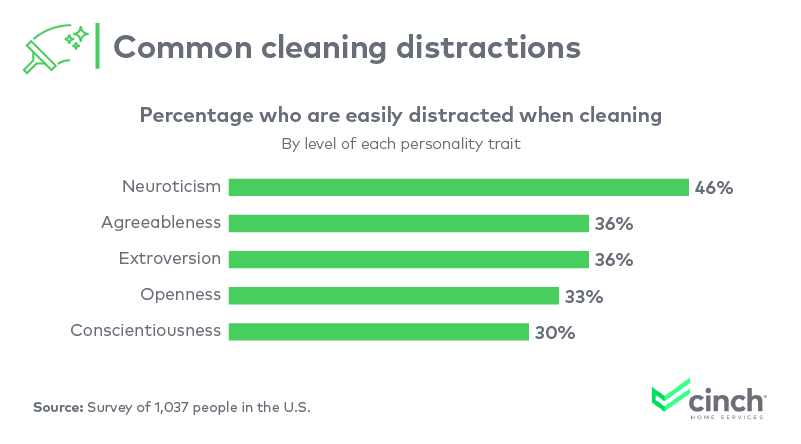
Highly neurotic respondents were quite likely to get sidetracked while tidying up. Their difficulty coping with stress might make chores a more draining experience, causing them to need a break or a change of pace before getting the job done.
What are the distractions that pull people away from their cleaning duties, though? A mix of family needs, hunger, TV shows or movies, social media and boredom were the main factors. While the first two are sensible reasons to put cleaning on hold, it seems that the idea of relaxing often tempts people into dropping the mop to tend to their electronic devices instead.
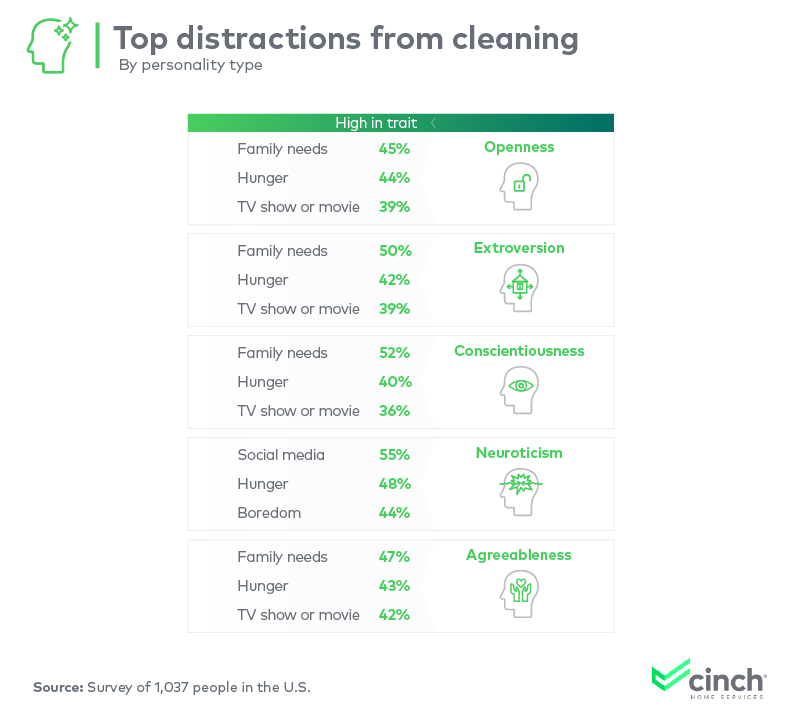
When respondents do commit to tidying up, we wanted to know the strategy they use to keep track of their cleaning list. Well over half of them relied solely on their memory, whereas 48% made a regimented routine for themselves. Highly neurotic people deemed whatever was dirtiest to be their first priority, likely removing a major stressor in the process.
Love is in the air
Some people buy flowers for their loved ones, others give them a massage. That said, wiping the counters or vacuuming the floor are loving gestures in their own right, too. Let's see what respondents' most preferred Love Languages are, and who's most likely to clean as an act of love.
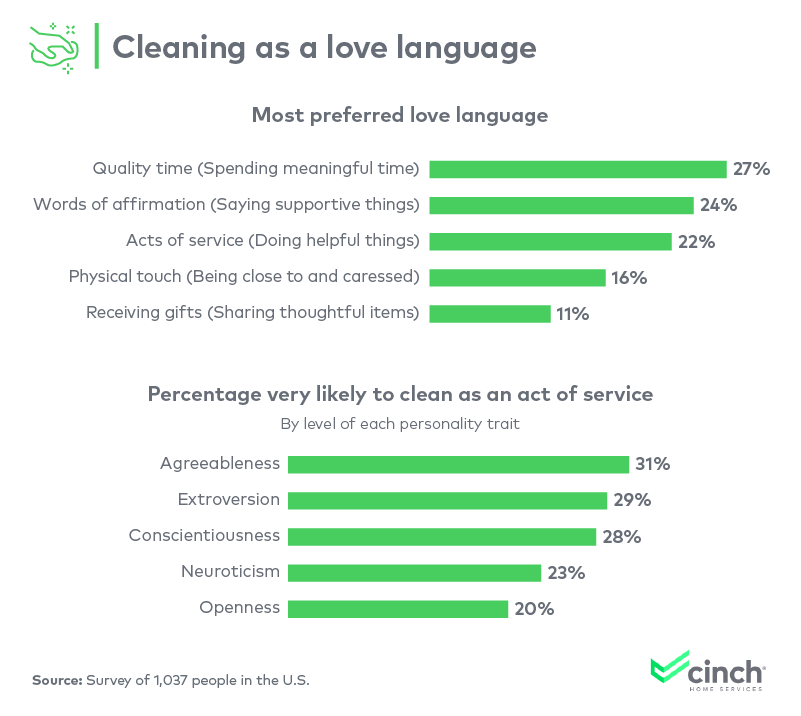
While spending quality time together and being verbally supportive ranked as the two most popular love languages, acts of service—performing helpful tasks for each other—weren't so far behind. Cleaning definitely falls into this category, and although cleaning as an act of service was not a hugely popular choice, between a fifth and third of all respondents were very likely to adopt this approach.
When broken down by generation, a third of millennials were very likely to clean as an act of service, with about 1 in 4 Gen Xers (29%) and Gen Zers (23%) in agreement. Only 15% of baby boomers used cleaning as a demonstration of love. With evidence showing that this particular love language can help strengthen your relationship more than you know, perhaps more people should be trying it.
To each their own
Respondents were first asked about their cleaning frequency, and unsurprisingly, those with a low level of conscientiousness cleaned the least. This same group was evenly split on defining the term "messy," unable to come to a conclusion as to whether the word "clutter" or "dirty" was a more fitting descriptor. All other respondents favored the former. Our surveyees were then asked if they become disgusted upon entering an unclean home. People who ranked low on agreeableness also appeared to have the weakest stomachs in this respect. Meanwhile, those low on the conscientiousness spectrum were also the most likely to get distracted during chore duty.
Lastly, we got a little personal with respondents, asking them about their preferred Love Language. We learned that the savvy among them used cleaning as an act of service, and what better way to demonstrate your love than by signing up for a Cinch Home Services warranty protection plan to keep your home in tip-top shape? An award-winning service with over 40 years of experience, Cinch keeps your appliances running smoothly so you have more time to focus on what really matters—such as your personal relationships. Head over now to learn more about the best appliance protection coverage in the country.
Methodology and limitations
We used Amazon Mechanical Turk to survey 1,037 respondents in the U.S., ranging in age from 18 to 85 year old. The mean age was 38. 45% of respondents identified as men, 54% as women and about 1% as nonbinary or nonconforming. Generational breakdowns were as follows:
- Generation Z: 218
- Millennials: 387
- Generation X: 290
- Baby boomers or older: 142
To help ensure that all respondents took our survey seriously, they were required to identify and correctly answer an attention-check question. Survey data have certain limitations related to self-reporting. These limitations include telescoping, exaggeration and selective memory.
Fair use statement
Who knew that cleaning could be so deep? If you'd like to share this piece with anyone you know, go right ahead! We just kindly ask that you do so for noncommercial use only, and to provide a link back to the original page so the contributors can earn credit for their work.
